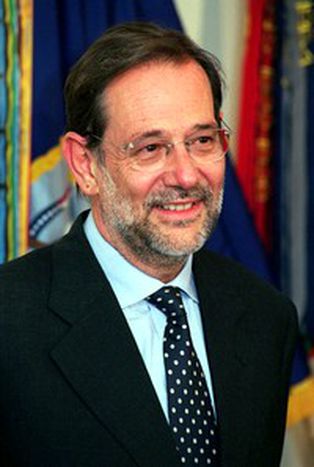
And the Charlemagne prize goes to ... Javier Solana
Published on
Translation by:
 claire mcbride
claire mcbride
2007's International Charlemagne Prize of the City of Aachen (Karlspreis) goes to the EU foreign policy chief on 17 May, who describes it as 'more valuable than a Nobel Prize'
For weeks things have been good in the stars in Aachen. European flags fly dutifully on advertising columns. Awarding the Karlspreis is a great European Event, and Spaniard and EU foreign policy chief Javier Solana de Madriaga, 65, is the lucky winner, describing the honour as ‘better than a Nobel Prize.'
The award originates from a citizen initiative based in Aachen, that an annual European prize recognise people and institutions who have ‘worked especially hard to serve Europe and European Unity.’ Previous recipients include Konrad Adenauer, Jean Monnet, Helmut Kohl and Bill Clinton.
Not free from controversy
The west German city, with a population of 250,000, overwhelms visitors with its distinct European atmosphere and flamboyance, abundle with preparation activity for the ceremony. Omnipresent placards and signs invite you to a series of lectures entitled ‘Europe’s Memories.' Debates and exhibitions all over Europe go on to discuss Karl the Great himself, describing 'The Godfather' as the ‘European myth.'
Karl the Great was the first unifier in Europe, according to the Karlspreis society log book who initiated the award in 1950. However the merited Carolus Magnus - his Latin name – is disputed. Critics argue that his successful European power-politics were accompanied by gruesome sights and bloodshed.
Of course this doesn’t compare with the controversy surrounding so many of today’s prizewinners. But it is definitely an irony of fate. In 2005, another citizen initiative in Aachen tried to deprive Henry Kissinger (foreign affairs advisor to then US president Richard Nixon (1969 - 1973) and foreign minister of America until 1977), of the prize in 1987. The main reason cited was US involvement in the putsch against Chilean President Augusto Pinochet in 1973.
Even Bill Clinton’s award in 2000 was criticised by some of Aachen’s citizens. ‘Only a year before he received the award he entered the NATO-Yugoslavia conflict!’ mocks Esther Knab, 24, whilst on our tour of Aachen’s Old Town, referring to the collapse of the Slobodan Milosevic regime in Yugoslavia.
‘Solana is the right man’
The war against Yugoslovia in 1999 is the cause of another citizen’s platform to protest against Solana, one-time NATO General Secretary. 'If we are serious about new threats and about creating more flexible mobile forces we need to increase defence resources,' said Solana in a military strategy paper to the EU once. It is this 'increasing militarisation of Europe's foreign policy' in his current role that has disturbed critics most.
The Charlemagne prize board of directors on the other hand regard the Spanish diplomat as a mediator in the name of the EU ‘in all the big conflicts around the world’ – above all for his work in the Balkans. This and his ‘influential personal biography’, which during the Franco regime had to have several bits cut out, make Solana a worthy winner of the prize. Even Jürgen Linden, mayor of Aachen, sees him as Europe's 'most efficient worker.' Linden continues to say that the former physics professor (at Virginia Tech University in the US), represents Europe’s position for peace in the world.
This is an opinion which the activists in the ‘No Charlemagne prize for Solana!' camp certainly don’t endorse. In March, they took out a newspaper advertisement in protest. It is just this sort of action which shows even more how fiercely the town and its citizens identify with the Charlemagne prize.
But Christian Helmich, 35 is convinced that Solana is the 'right man. His job demands that he always and decidedly works for the European project. How then can anyone argue that he is not a worthy recipient of this commendation?’
Translated from Karlspreis an Solana: „Wertvoller als der Nobelpreis“


